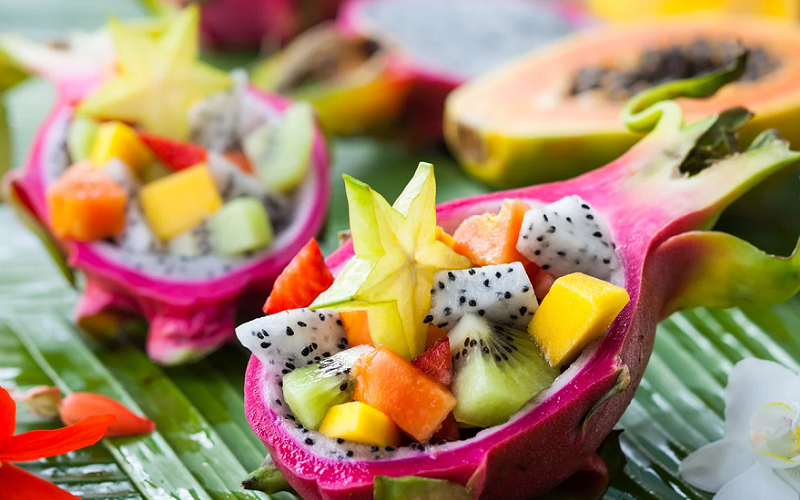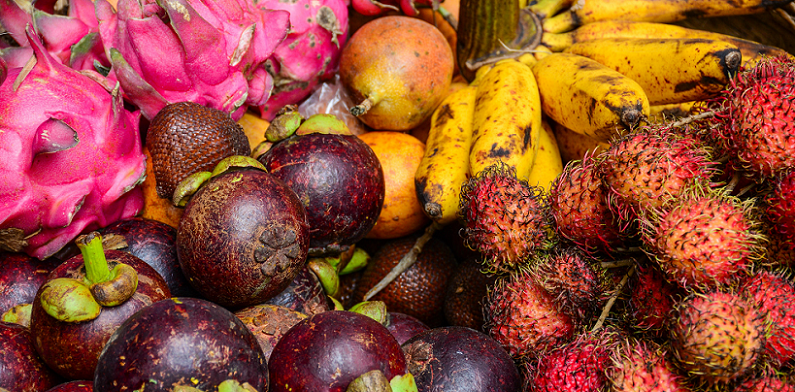
In recent years, the quest for maintaining cognitive health and preventing decline has led us down many nutritional paths. Among these, a fascinating and often overlooked avenue is the world of exotic fruits. While many of us are familiar with the usual suspects in the superfood realm, like blueberries and kale, there’s a whole spectrum of exotic fruits that are not only delightful to the palate but also packed with nutrients essential for brain health. These fruits, often brimming with antioxidants, anti-inflammatory properties, and unique phytochemicals, offer a new dimension to our understanding of diet and cognitive wellness.
Contents
Introduction to Cognitive Decline and Exotic Fruits
The quest for maintaining optimal brain health and delaying cognitive decline has become a cornerstone of modern health discussions. In this era of abundant information and scientific research, we increasingly understand the profound impact of diet on our cognitive well-being. Certain fruits, often exotic and lesser-known, can significantly contribute to maintaining and enhancing cognitive functions.
Explanation of Cognitive Decline
Cognitive decline, a concern for many as we age, refers to the gradual deterioration of brain functions, including memory, thinking, and reasoning skills. It’s a natural process, but various factors like lifestyle, environment, and genetics can influence its pace and severity. As we delve into this topic, it’s crucial to understand the intricate relationship between what we eat and how our brains function over time.
Importance of Diet in Cognitive Health
The adage “You are what you eat” holds particular truth when it comes to brain health. Nutrition plays a pivotal role in not just our physical well-being, but also in the health of our cognitive functions. A balanced diet, rich in essential nutrients, can help in maintaining brain health, slowing cognitive decline, and even potentially reducing the risk of neurodegenerative diseases.
Introduction to Exotic Fruits as Superfoods
In our exploration of dietary impacts on cognitive health, we turn to a group of foods often overlooked in the mainstream health narrative: exotic fruits. These fruits, originating from various parts of the world, are not just a treat to the senses but are packed with a myriad of nutrients beneficial for brain health. This post aims to shed light on these exotic superfoods, their unique benefits, and how they can be integrated into our daily diets to support cognitive longevity [1].

Nutritional Needs for Cognitive Health
A critical aspect of maintaining cognitive health lies in understanding the specific nutritional needs of the brain. The human brain, a complex and energy-intensive organ, requires a range of nutrients to function optimally.
Essential Nutrients for the Brain
The brain’s health is heavily reliant on certain key nutrients. Omega-3 fatty acids, for instance, are vital for maintaining brain cell structure and function. They are found in high concentrations in the brain and are crucial for cognitive processes such as memory and learning. B vitamins, particularly B6, B9 (folate), and B12, are also essential. They play a role in reducing homocysteine levels in the blood, high levels of which are associated with cognitive decline and dementia. Minerals like magnesium, zinc, and iron are crucial for neurotransmitter function and brain development. Lastly, antioxidants, which combat oxidative stress, are vital for preserving brain health.
Role of Antioxidants and Anti-inflammatory Compounds
Oxidative stress and inflammation are two key processes that contribute to cognitive decline. Antioxidants, which include vitamins C and E, and flavonoids, help neutralize free radicals, thus protecting the brain from oxidative stress. Similarly, anti-inflammatory compounds, like those found in turmeric and omega-3 fatty acids, can help reduce inflammation in the brain. Chronic inflammation is linked to many neurodegenerative diseases, so managing it is crucial for maintaining cognitive health [2].
Connection Between Gut Health and Brain Function
Recent research has uncovered a fascinating link between gut health and brain function, often referred to as the gut-brain axis. The gut microbiome, the vast community of microorganisms living in our intestines, influences brain health in several ways. It affects the body’s immune response, produces brain-signaling chemicals, and even helps generate essential nutrients. A diet rich in fiber, probiotics, and prebiotics can support a healthy gut microbiome, which, in turn, supports cognitive health.
Exotic Fruits: Hidden Gems for Cognitive Longevity
As we venture further into the realm of cognitive health, we encounter an array of exotic fruits that offer unique nutritional benefits. These fruits, often hailed as hidden gems due to their exceptional nutrient profiles, can be integral in promoting cognitive longevity.
Criteria for Classifying a Fruit as “Exotic”
The term ‘exotic’ in the context of fruits typically refers to those that are not native to one’s local environment and are often imported from distant regions. These fruits are characterized by their unique flavors, appearances, and, most importantly, their distinct nutritional compositions. Exotic fruits often contain a higher concentration of certain vitamins, minerals, and antioxidants compared to more common fruits, making them particularly valuable for cognitive health [3].
Unique Nutritional Profiles of Exotic Fruits
Exotic fruits are treasure troves of nutrients beneficial for brain health. Many of these fruits are rich in antioxidants, which help combat oxidative stress in the brain, a factor linked to cognitive decline. They also often contain high levels of vitamins, particularly vitamin C and E, which are crucial for protecting brain cells from damage. Furthermore, these fruits can be excellent sources of dietary fiber, which is beneficial for gut health, thereby positively influencing brain health through the gut-brain axis. Their unique phytochemicals can also have anti-inflammatory properties, further supporting cognitive functions.
The nutritional profiles of these exotic fruits are not only unique but also diverse. This diversity means that including a variety of these fruits in one’s diet can provide a wide range of nutrients essential for maintaining cognitive health.

Spotlight on Specific Exotic Fruits for Cognitive Longevity
Having established the unique benefits of exotic fruits for cognitive health, it’s time to spotlight some specific fruits that are particularly noteworthy. Each of these fruits not only offers a unique taste but also brings a host of benefits for cognitive function and overall brain health.
Acai Berries: Nutrient Profile and Benefits
Acai berries, native to the rainforests of South America, are small, dark purple fruits known for their high antioxidant content. These berries are particularly rich in anthocyanins, a type of flavonoid with strong anti-inflammatory and antioxidant properties. These compounds can help in reducing oxidative stress and inflammation in the brain, which are linked to age-related cognitive decline. Acai berries are also a good source of fatty acids, which contribute to maintaining the health of brain cells [4].
Dragon Fruit: Composition and Cognitive Advantages
Dragon fruit, or pitaya, with its vibrant pink skin and speckled flesh, is not just visually striking but also nutritionally impressive. It is rich in vitamin C, antioxidants, and prebiotic fibers, which promote gut health. The gut-brain axis plays a crucial role in cognitive health, and by supporting gut health, dragon fruit indirectly supports brain health. The antioxidants in dragon fruit can help protect the brain from oxidative damage, a key factor in maintaining cognitive function.
Mangosteen: Antioxidants and Mental Health
Mangosteen, often called the “queen of fruits,” is a tropical fruit known for its sweet and tangy flavor. It is a rich source of xanthones, powerful antioxidants that have been studied for their neuroprotective properties. These antioxidants can help in protecting brain cells from oxidative stress and inflammation, both of which can contribute to cognitive decline. Additionally, mangosteen has been found to have mood-enhancing properties, which can be beneficial in managing stress and supporting overall mental health.
Noni Fruit: Traditional Use and Modern Research
Noni fruit, a staple in traditional Polynesian medicine, has a distinct flavor and a wealth of health benefits. It contains several compounds that have been shown to have neuroprotective effects, including improving brain function and potentially reducing the risk of neurodegenerative diseases. Noni fruit is also rich in antioxidants and anti-inflammatory compounds, which can help in protecting the brain from age-related damage [5].
Baobab: High Fiber and Cognitive Impact
Baobab, native to Africa, is known for its high fiber content, antioxidants, and vitamin C. The fiber in baobab can aid in maintaining a healthy gut microbiome, which is essential for cognitive health due to the gut-brain connection. The antioxidants and vitamin C in baobab help in combating oxidative stress in the brain, thus supporting cognitive functions and potentially slowing cognitive decline.
References
[1] Medicinal Effect of Nutraceutical Fruits for the Cognition and Brain Health
[2] Role of fruit and vegetables in sustaining healthy cognitive function: evidence and issues
[3] Increased Intake of Vegetables and Fruits Improves Cognitive Function
[4] How to live longer: Blueberries may reduce age-related diseases to boost longevity
[5] 5 Foods You Should Eat Every Day to Boost Your Longevity, According to Science

